Developing Individuals, Teams and Organisations
VerifiedAdded on 2023/03/24
|14
|3753
|55
AI Summary
This study explores the impact of professional skills and knowledge of employees on organisational performance. It focuses on the role of HR consultants in Whirlpool and their skills, knowledge, and behavioural approaches. It also discusses the difference between individual and organisational training, learning, and development. Additionally, it highlights the importance of continuous learning and professional development for driving sustainable organisational performance.
Contribute Materials
Your contribution can guide someone’s learning journey. Share your
documents today.
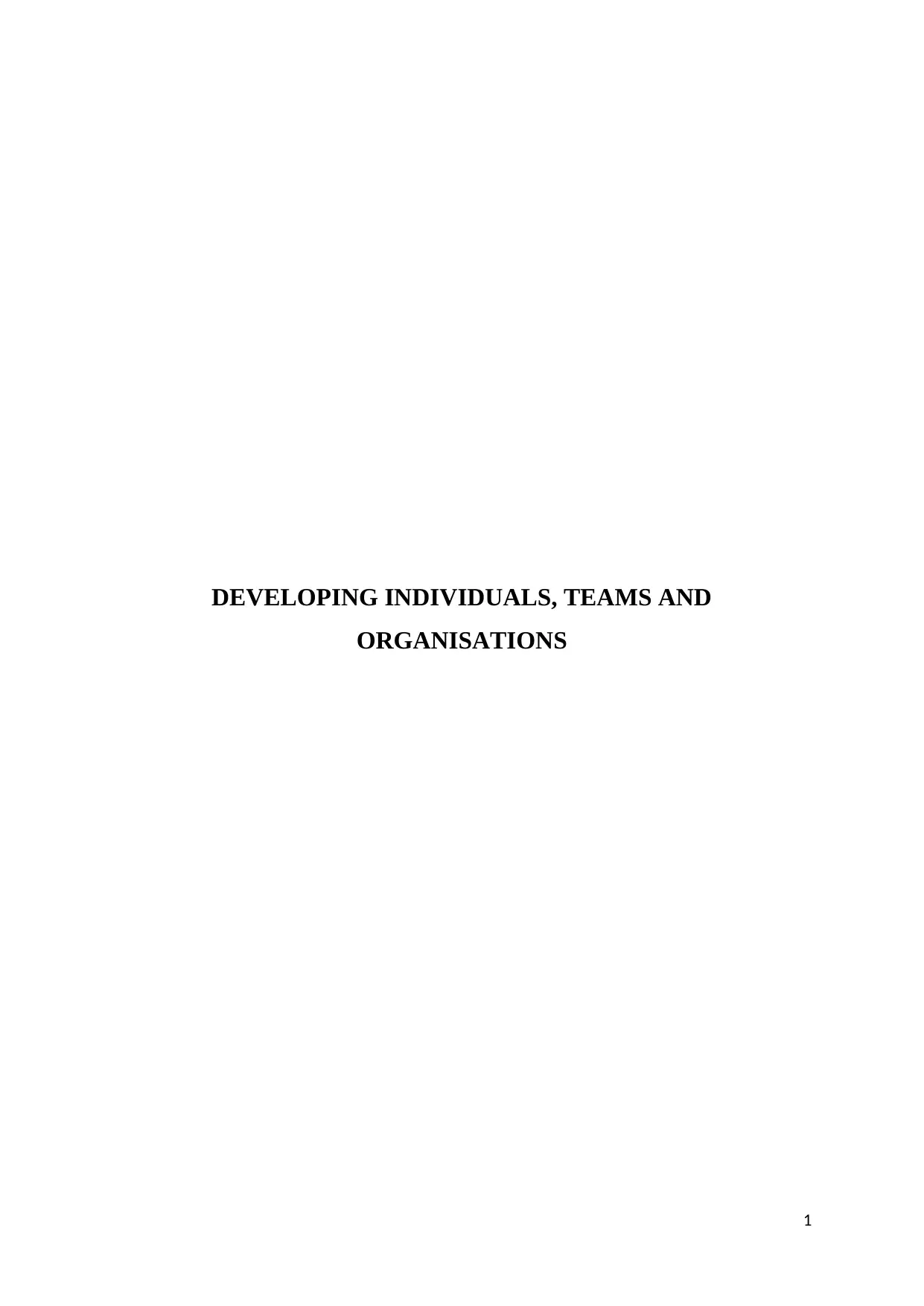
DEVELOPING INDIVIDUALS, TEAMS AND
ORGANISATIONS
1
ORGANISATIONS
1
Secure Best Marks with AI Grader
Need help grading? Try our AI Grader for instant feedback on your assignments.
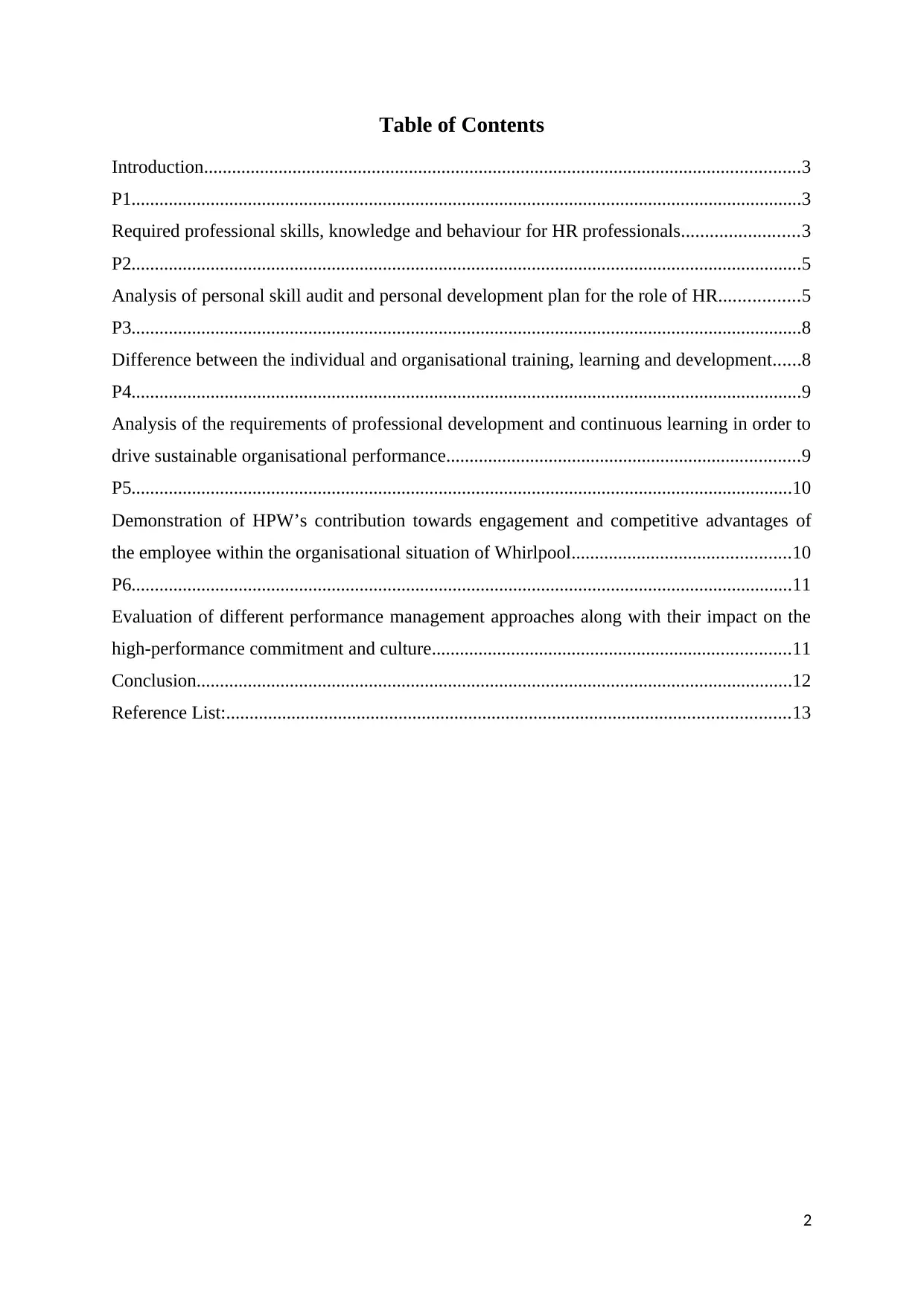
Table of Contents
Introduction................................................................................................................................3
P1................................................................................................................................................3
Required professional skills, knowledge and behaviour for HR professionals.........................3
P2................................................................................................................................................5
Analysis of personal skill audit and personal development plan for the role of HR.................5
P3................................................................................................................................................8
Difference between the individual and organisational training, learning and development......8
P4................................................................................................................................................9
Analysis of the requirements of professional development and continuous learning in order to
drive sustainable organisational performance............................................................................9
P5..............................................................................................................................................10
Demonstration of HPW’s contribution towards engagement and competitive advantages of
the employee within the organisational situation of Whirlpool...............................................10
P6..............................................................................................................................................11
Evaluation of different performance management approaches along with their impact on the
high-performance commitment and culture.............................................................................11
Conclusion................................................................................................................................12
Reference List:.........................................................................................................................13
2
Introduction................................................................................................................................3
P1................................................................................................................................................3
Required professional skills, knowledge and behaviour for HR professionals.........................3
P2................................................................................................................................................5
Analysis of personal skill audit and personal development plan for the role of HR.................5
P3................................................................................................................................................8
Difference between the individual and organisational training, learning and development......8
P4................................................................................................................................................9
Analysis of the requirements of professional development and continuous learning in order to
drive sustainable organisational performance............................................................................9
P5..............................................................................................................................................10
Demonstration of HPW’s contribution towards engagement and competitive advantages of
the employee within the organisational situation of Whirlpool...............................................10
P6..............................................................................................................................................11
Evaluation of different performance management approaches along with their impact on the
high-performance commitment and culture.............................................................................11
Conclusion................................................................................................................................12
Reference List:.........................................................................................................................13
2
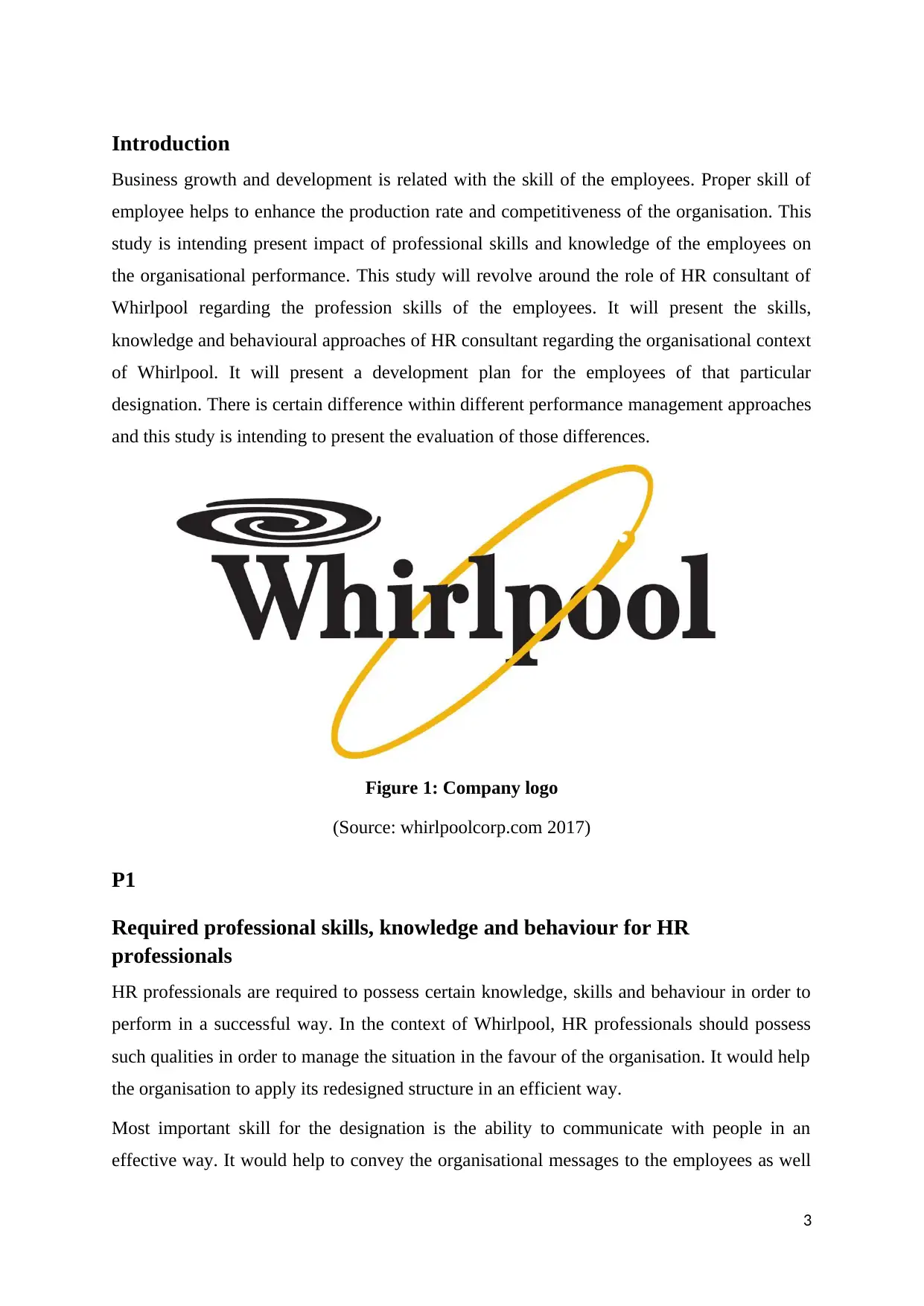
Introduction
Business growth and development is related with the skill of the employees. Proper skill of
employee helps to enhance the production rate and competitiveness of the organisation. This
study is intending present impact of professional skills and knowledge of the employees on
the organisational performance. This study will revolve around the role of HR consultant of
Whirlpool regarding the profession skills of the employees. It will present the skills,
knowledge and behavioural approaches of HR consultant regarding the organisational context
of Whirlpool. It will present a development plan for the employees of that particular
designation. There is certain difference within different performance management approaches
and this study is intending to present the evaluation of those differences.
Figure 1: Company logo
(Source: whirlpoolcorp.com 2017)
P1
Required professional skills, knowledge and behaviour for HR
professionals
HR professionals are required to possess certain knowledge, skills and behaviour in order to
perform in a successful way. In the context of Whirlpool, HR professionals should possess
such qualities in order to manage the situation in the favour of the organisation. It would help
the organisation to apply its redesigned structure in an efficient way.
Most important skill for the designation is the ability to communicate with people in an
effective way. It would help to convey the organisational messages to the employees as well
3
Business growth and development is related with the skill of the employees. Proper skill of
employee helps to enhance the production rate and competitiveness of the organisation. This
study is intending present impact of professional skills and knowledge of the employees on
the organisational performance. This study will revolve around the role of HR consultant of
Whirlpool regarding the profession skills of the employees. It will present the skills,
knowledge and behavioural approaches of HR consultant regarding the organisational context
of Whirlpool. It will present a development plan for the employees of that particular
designation. There is certain difference within different performance management approaches
and this study is intending to present the evaluation of those differences.
Figure 1: Company logo
(Source: whirlpoolcorp.com 2017)
P1
Required professional skills, knowledge and behaviour for HR
professionals
HR professionals are required to possess certain knowledge, skills and behaviour in order to
perform in a successful way. In the context of Whirlpool, HR professionals should possess
such qualities in order to manage the situation in the favour of the organisation. It would help
the organisation to apply its redesigned structure in an efficient way.
Most important skill for the designation is the ability to communicate with people in an
effective way. It would help to convey the organisational messages to the employees as well
3
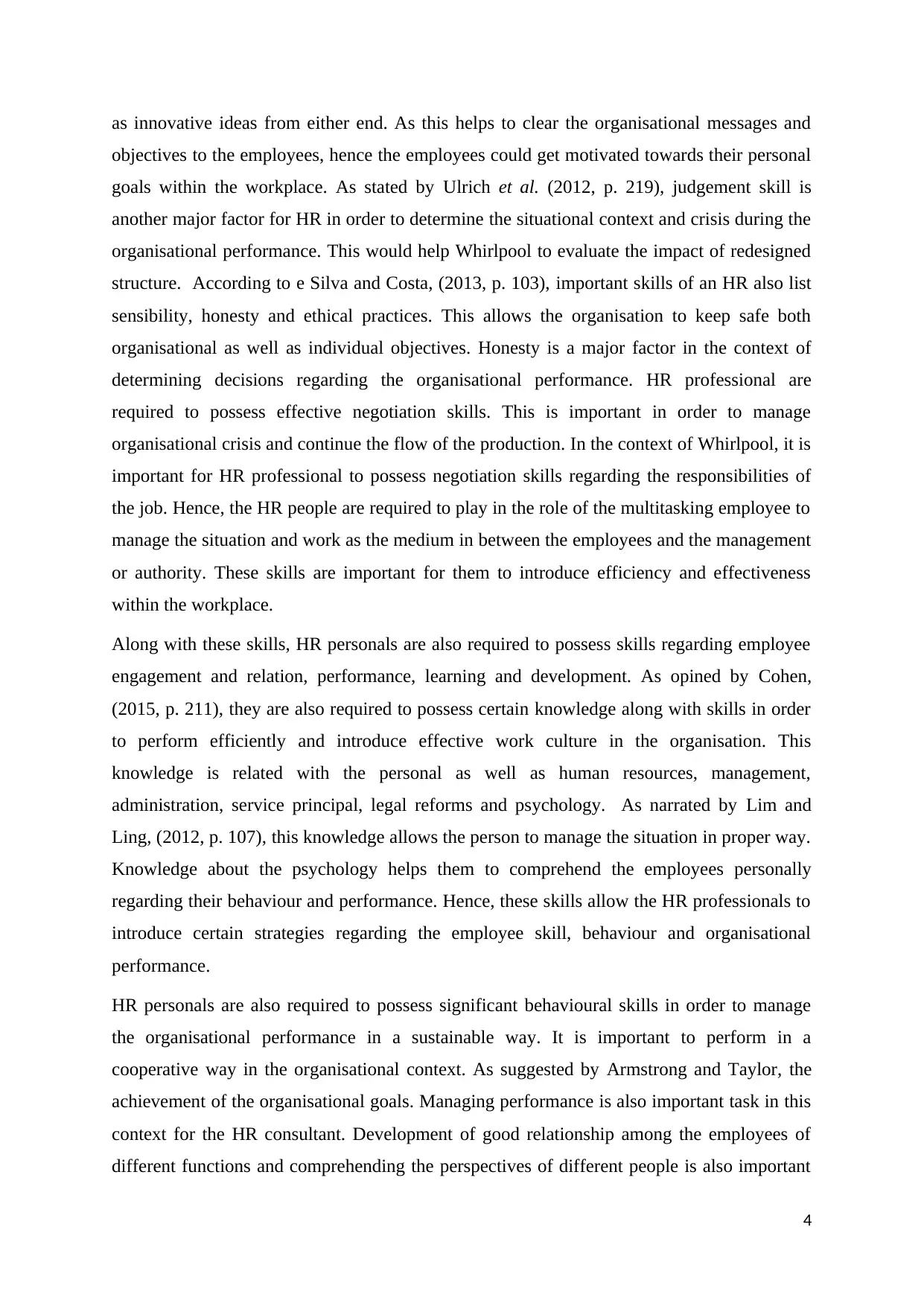
as innovative ideas from either end. As this helps to clear the organisational messages and
objectives to the employees, hence the employees could get motivated towards their personal
goals within the workplace. As stated by Ulrich et al. (2012, p. 219), judgement skill is
another major factor for HR in order to determine the situational context and crisis during the
organisational performance. This would help Whirlpool to evaluate the impact of redesigned
structure. According to e Silva and Costa, (2013, p. 103), important skills of an HR also list
sensibility, honesty and ethical practices. This allows the organisation to keep safe both
organisational as well as individual objectives. Honesty is a major factor in the context of
determining decisions regarding the organisational performance. HR professional are
required to possess effective negotiation skills. This is important in order to manage
organisational crisis and continue the flow of the production. In the context of Whirlpool, it is
important for HR professional to possess negotiation skills regarding the responsibilities of
the job. Hence, the HR people are required to play in the role of the multitasking employee to
manage the situation and work as the medium in between the employees and the management
or authority. These skills are important for them to introduce efficiency and effectiveness
within the workplace.
Along with these skills, HR personals are also required to possess skills regarding employee
engagement and relation, performance, learning and development. As opined by Cohen,
(2015, p. 211), they are also required to possess certain knowledge along with skills in order
to perform efficiently and introduce effective work culture in the organisation. This
knowledge is related with the personal as well as human resources, management,
administration, service principal, legal reforms and psychology. As narrated by Lim and
Ling, (2012, p. 107), this knowledge allows the person to manage the situation in proper way.
Knowledge about the psychology helps them to comprehend the employees personally
regarding their behaviour and performance. Hence, these skills allow the HR professionals to
introduce certain strategies regarding the employee skill, behaviour and organisational
performance.
HR personals are also required to possess significant behavioural skills in order to manage
the organisational performance in a sustainable way. It is important to perform in a
cooperative way in the organisational context. As suggested by Armstrong and Taylor, the
achievement of the organisational goals. Managing performance is also important task in this
context for the HR consultant. Development of good relationship among the employees of
different functions and comprehending the perspectives of different people is also important
4
objectives to the employees, hence the employees could get motivated towards their personal
goals within the workplace. As stated by Ulrich et al. (2012, p. 219), judgement skill is
another major factor for HR in order to determine the situational context and crisis during the
organisational performance. This would help Whirlpool to evaluate the impact of redesigned
structure. According to e Silva and Costa, (2013, p. 103), important skills of an HR also list
sensibility, honesty and ethical practices. This allows the organisation to keep safe both
organisational as well as individual objectives. Honesty is a major factor in the context of
determining decisions regarding the organisational performance. HR professional are
required to possess effective negotiation skills. This is important in order to manage
organisational crisis and continue the flow of the production. In the context of Whirlpool, it is
important for HR professional to possess negotiation skills regarding the responsibilities of
the job. Hence, the HR people are required to play in the role of the multitasking employee to
manage the situation and work as the medium in between the employees and the management
or authority. These skills are important for them to introduce efficiency and effectiveness
within the workplace.
Along with these skills, HR personals are also required to possess skills regarding employee
engagement and relation, performance, learning and development. As opined by Cohen,
(2015, p. 211), they are also required to possess certain knowledge along with skills in order
to perform efficiently and introduce effective work culture in the organisation. This
knowledge is related with the personal as well as human resources, management,
administration, service principal, legal reforms and psychology. As narrated by Lim and
Ling, (2012, p. 107), this knowledge allows the person to manage the situation in proper way.
Knowledge about the psychology helps them to comprehend the employees personally
regarding their behaviour and performance. Hence, these skills allow the HR professionals to
introduce certain strategies regarding the employee skill, behaviour and organisational
performance.
HR personals are also required to possess significant behavioural skills in order to manage
the organisational performance in a sustainable way. It is important to perform in a
cooperative way in the organisational context. As suggested by Armstrong and Taylor, the
achievement of the organisational goals. Managing performance is also important task in this
context for the HR consultant. Development of good relationship among the employees of
different functions and comprehending the perspectives of different people is also important
4
Secure Best Marks with AI Grader
Need help grading? Try our AI Grader for instant feedback on your assignments.
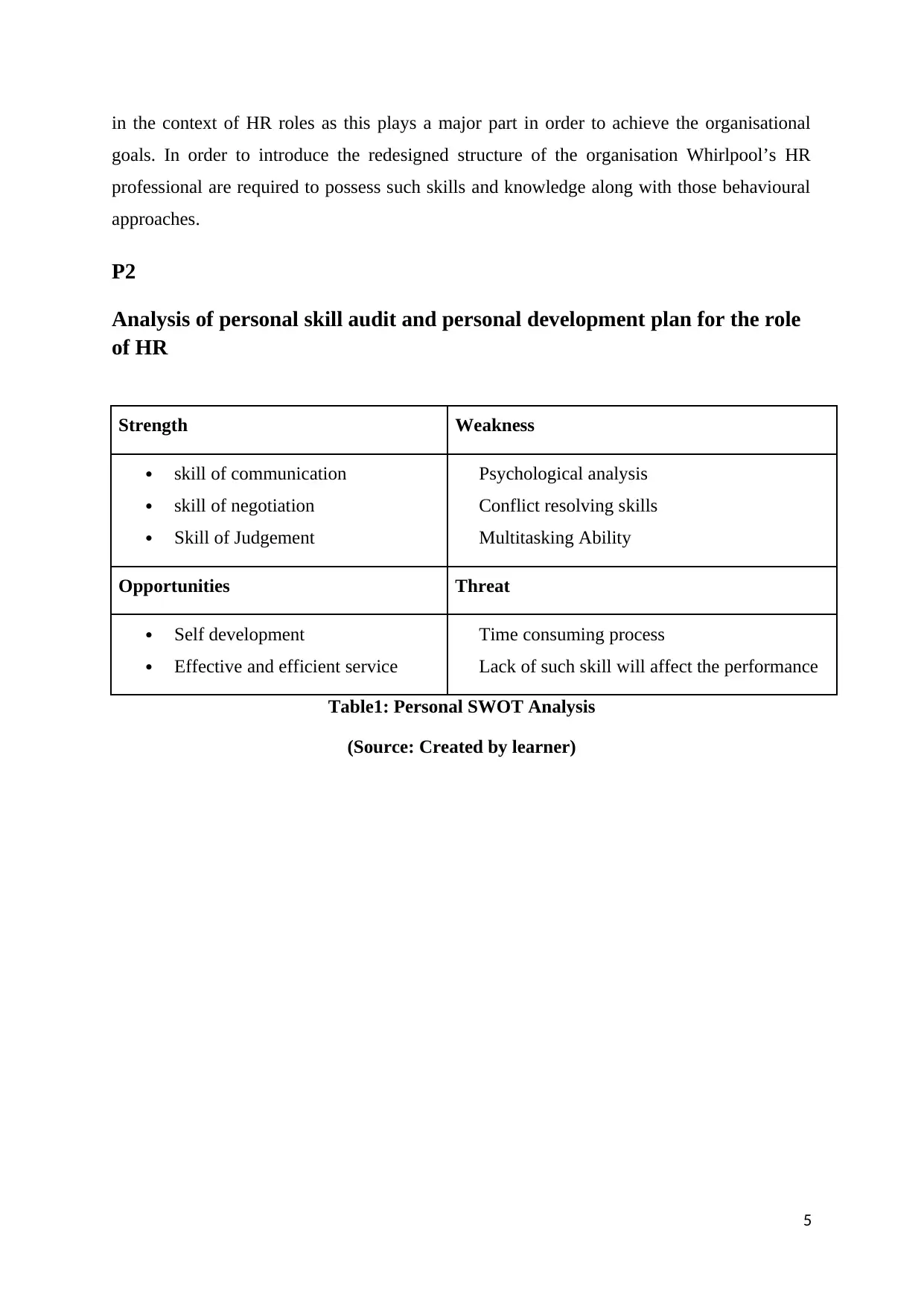
in the context of HR roles as this plays a major part in order to achieve the organisational
goals. In order to introduce the redesigned structure of the organisation Whirlpool’s HR
professional are required to possess such skills and knowledge along with those behavioural
approaches.
P2
Analysis of personal skill audit and personal development plan for the role
of HR
Strength Weakness
skill of communication
skill of negotiation
Skill of Judgement
Psychological analysis
Conflict resolving skills
Multitasking Ability
Opportunities Threat
Self development
Effective and efficient service
Time consuming process
Lack of such skill will affect the performance
Table1: Personal SWOT Analysis
(Source: Created by learner)
5
goals. In order to introduce the redesigned structure of the organisation Whirlpool’s HR
professional are required to possess such skills and knowledge along with those behavioural
approaches.
P2
Analysis of personal skill audit and personal development plan for the role
of HR
Strength Weakness
skill of communication
skill of negotiation
Skill of Judgement
Psychological analysis
Conflict resolving skills
Multitasking Ability
Opportunities Threat
Self development
Effective and efficient service
Time consuming process
Lack of such skill will affect the performance
Table1: Personal SWOT Analysis
(Source: Created by learner)
5
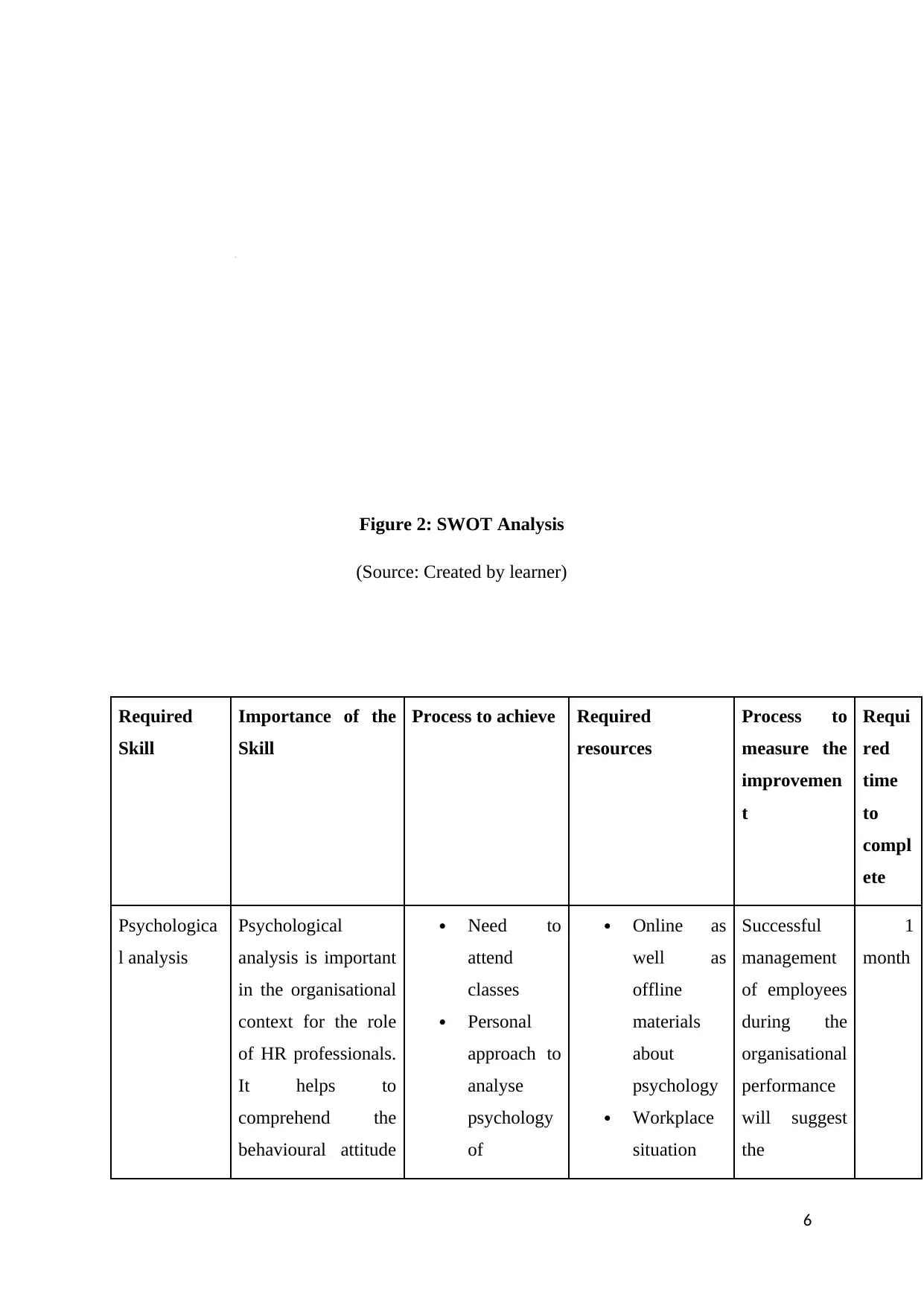
Figure 2: SWOT Analysis
(Source: Created by learner)
Required
Skill
Importance of the
Skill
Process to achieve Required
resources
Process to
measure the
improvemen
t
Requi
red
time
to
compl
ete
Psychologica
l analysis
Psychological
analysis is important
in the organisational
context for the role
of HR professionals.
It helps to
comprehend the
behavioural attitude
Need to
attend
classes
Personal
approach to
analyse
psychology
of
Online as
well as
offline
materials
about
psychology
Workplace
situation
Successful
management
of employees
during the
organisational
performance
will suggest
the
1
month
6
STRENGTHWEAKNESSOPPORTUNITY
(Source: Created by learner)
Required
Skill
Importance of the
Skill
Process to achieve Required
resources
Process to
measure the
improvemen
t
Requi
red
time
to
compl
ete
Psychologica
l analysis
Psychological
analysis is important
in the organisational
context for the role
of HR professionals.
It helps to
comprehend the
behavioural attitude
Need to
attend
classes
Personal
approach to
analyse
psychology
of
Online as
well as
offline
materials
about
psychology
Workplace
situation
Successful
management
of employees
during the
organisational
performance
will suggest
the
1
month
6
STRENGTHWEAKNESSOPPORTUNITY
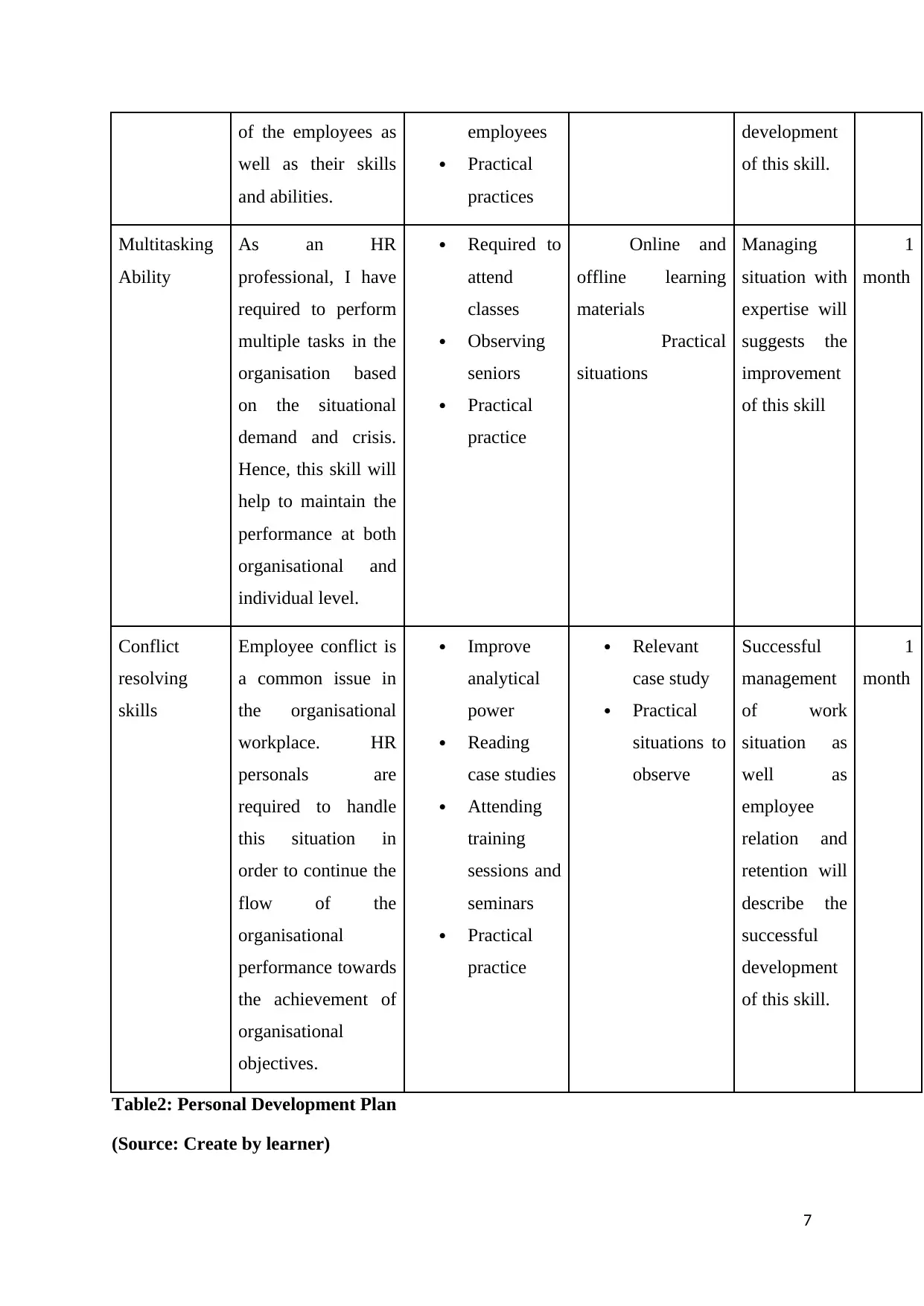
of the employees as
well as their skills
and abilities.
employees
Practical
practices
development
of this skill.
Multitasking
Ability
As an HR
professional, I have
required to perform
multiple tasks in the
organisation based
on the situational
demand and crisis.
Hence, this skill will
help to maintain the
performance at both
organisational and
individual level.
Required to
attend
classes
Observing
seniors
Practical
practice
Online and
offline learning
materials
Practical
situations
Managing
situation with
expertise will
suggests the
improvement
of this skill
1
month
Conflict
resolving
skills
Employee conflict is
a common issue in
the organisational
workplace. HR
personals are
required to handle
this situation in
order to continue the
flow of the
organisational
performance towards
the achievement of
organisational
objectives.
Improve
analytical
power
Reading
case studies
Attending
training
sessions and
seminars
Practical
practice
Relevant
case study
Practical
situations to
observe
Successful
management
of work
situation as
well as
employee
relation and
retention will
describe the
successful
development
of this skill.
1
month
Table2: Personal Development Plan
(Source: Create by learner)
7
well as their skills
and abilities.
employees
Practical
practices
development
of this skill.
Multitasking
Ability
As an HR
professional, I have
required to perform
multiple tasks in the
organisation based
on the situational
demand and crisis.
Hence, this skill will
help to maintain the
performance at both
organisational and
individual level.
Required to
attend
classes
Observing
seniors
Practical
practice
Online and
offline learning
materials
Practical
situations
Managing
situation with
expertise will
suggests the
improvement
of this skill
1
month
Conflict
resolving
skills
Employee conflict is
a common issue in
the organisational
workplace. HR
personals are
required to handle
this situation in
order to continue the
flow of the
organisational
performance towards
the achievement of
organisational
objectives.
Improve
analytical
power
Reading
case studies
Attending
training
sessions and
seminars
Practical
practice
Relevant
case study
Practical
situations to
observe
Successful
management
of work
situation as
well as
employee
relation and
retention will
describe the
successful
development
of this skill.
1
month
Table2: Personal Development Plan
(Source: Create by learner)
7
Paraphrase This Document
Need a fresh take? Get an instant paraphrase of this document with our AI Paraphraser
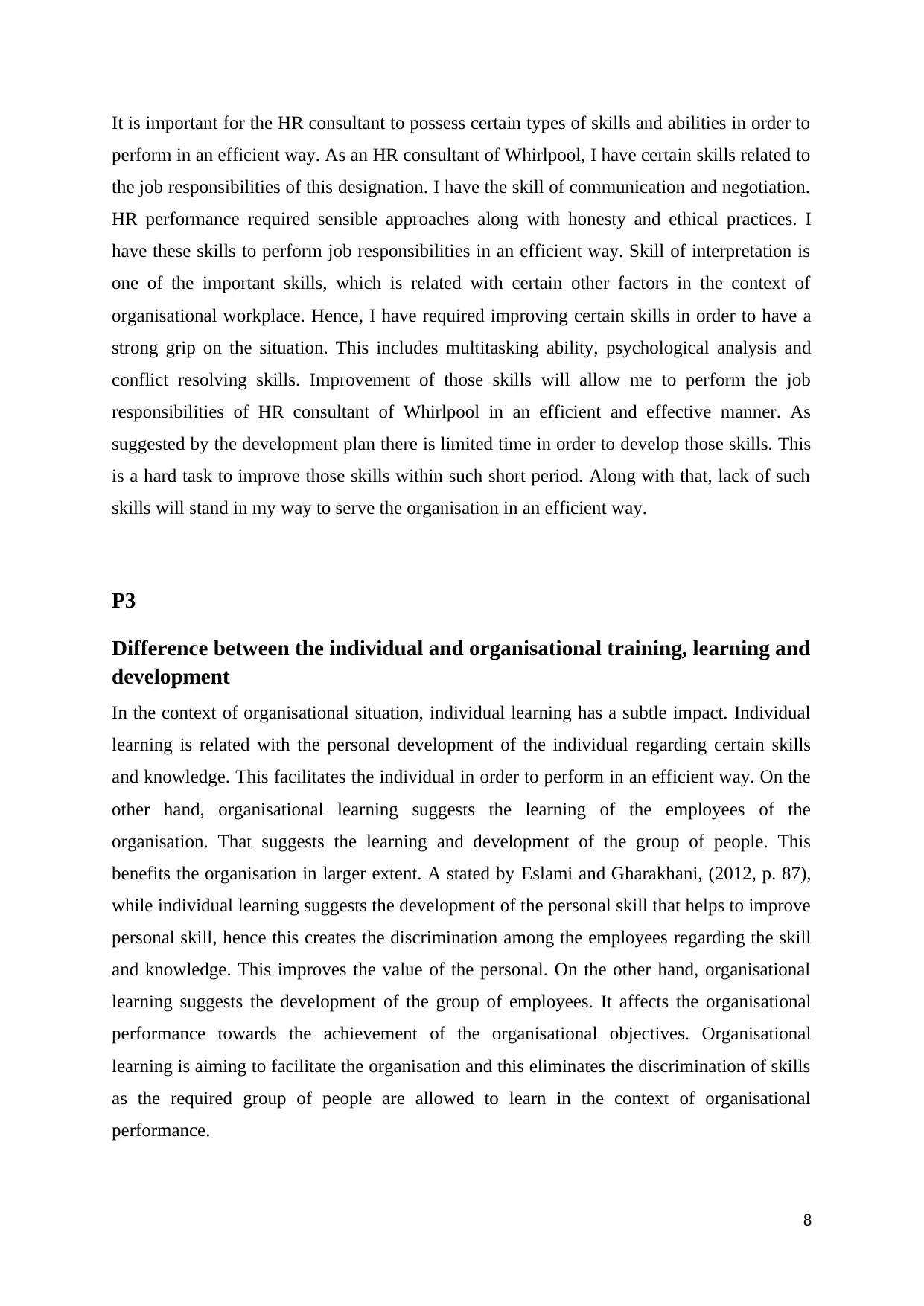
It is important for the HR consultant to possess certain types of skills and abilities in order to
perform in an efficient way. As an HR consultant of Whirlpool, I have certain skills related to
the job responsibilities of this designation. I have the skill of communication and negotiation.
HR performance required sensible approaches along with honesty and ethical practices. I
have these skills to perform job responsibilities in an efficient way. Skill of interpretation is
one of the important skills, which is related with certain other factors in the context of
organisational workplace. Hence, I have required improving certain skills in order to have a
strong grip on the situation. This includes multitasking ability, psychological analysis and
conflict resolving skills. Improvement of those skills will allow me to perform the job
responsibilities of HR consultant of Whirlpool in an efficient and effective manner. As
suggested by the development plan there is limited time in order to develop those skills. This
is a hard task to improve those skills within such short period. Along with that, lack of such
skills will stand in my way to serve the organisation in an efficient way.
P3
Difference between the individual and organisational training, learning and
development
In the context of organisational situation, individual learning has a subtle impact. Individual
learning is related with the personal development of the individual regarding certain skills
and knowledge. This facilitates the individual in order to perform in an efficient way. On the
other hand, organisational learning suggests the learning of the employees of the
organisation. That suggests the learning and development of the group of people. This
benefits the organisation in larger extent. A stated by Eslami and Gharakhani, (2012, p. 87),
while individual learning suggests the development of the personal skill that helps to improve
personal skill, hence this creates the discrimination among the employees regarding the skill
and knowledge. This improves the value of the personal. On the other hand, organisational
learning suggests the development of the group of employees. It affects the organisational
performance towards the achievement of the organisational objectives. Organisational
learning is aiming to facilitate the organisation and this eliminates the discrimination of skills
as the required group of people are allowed to learn in the context of organisational
performance.
8
perform in an efficient way. As an HR consultant of Whirlpool, I have certain skills related to
the job responsibilities of this designation. I have the skill of communication and negotiation.
HR performance required sensible approaches along with honesty and ethical practices. I
have these skills to perform job responsibilities in an efficient way. Skill of interpretation is
one of the important skills, which is related with certain other factors in the context of
organisational workplace. Hence, I have required improving certain skills in order to have a
strong grip on the situation. This includes multitasking ability, psychological analysis and
conflict resolving skills. Improvement of those skills will allow me to perform the job
responsibilities of HR consultant of Whirlpool in an efficient and effective manner. As
suggested by the development plan there is limited time in order to develop those skills. This
is a hard task to improve those skills within such short period. Along with that, lack of such
skills will stand in my way to serve the organisation in an efficient way.
P3
Difference between the individual and organisational training, learning and
development
In the context of organisational situation, individual learning has a subtle impact. Individual
learning is related with the personal development of the individual regarding certain skills
and knowledge. This facilitates the individual in order to perform in an efficient way. On the
other hand, organisational learning suggests the learning of the employees of the
organisation. That suggests the learning and development of the group of people. This
benefits the organisation in larger extent. A stated by Eslami and Gharakhani, (2012, p. 87),
while individual learning suggests the development of the personal skill that helps to improve
personal skill, hence this creates the discrimination among the employees regarding the skill
and knowledge. This improves the value of the personal. On the other hand, organisational
learning suggests the development of the group of employees. It affects the organisational
performance towards the achievement of the organisational objectives. Organisational
learning is aiming to facilitate the organisation and this eliminates the discrimination of skills
as the required group of people are allowed to learn in the context of organisational
performance.
8
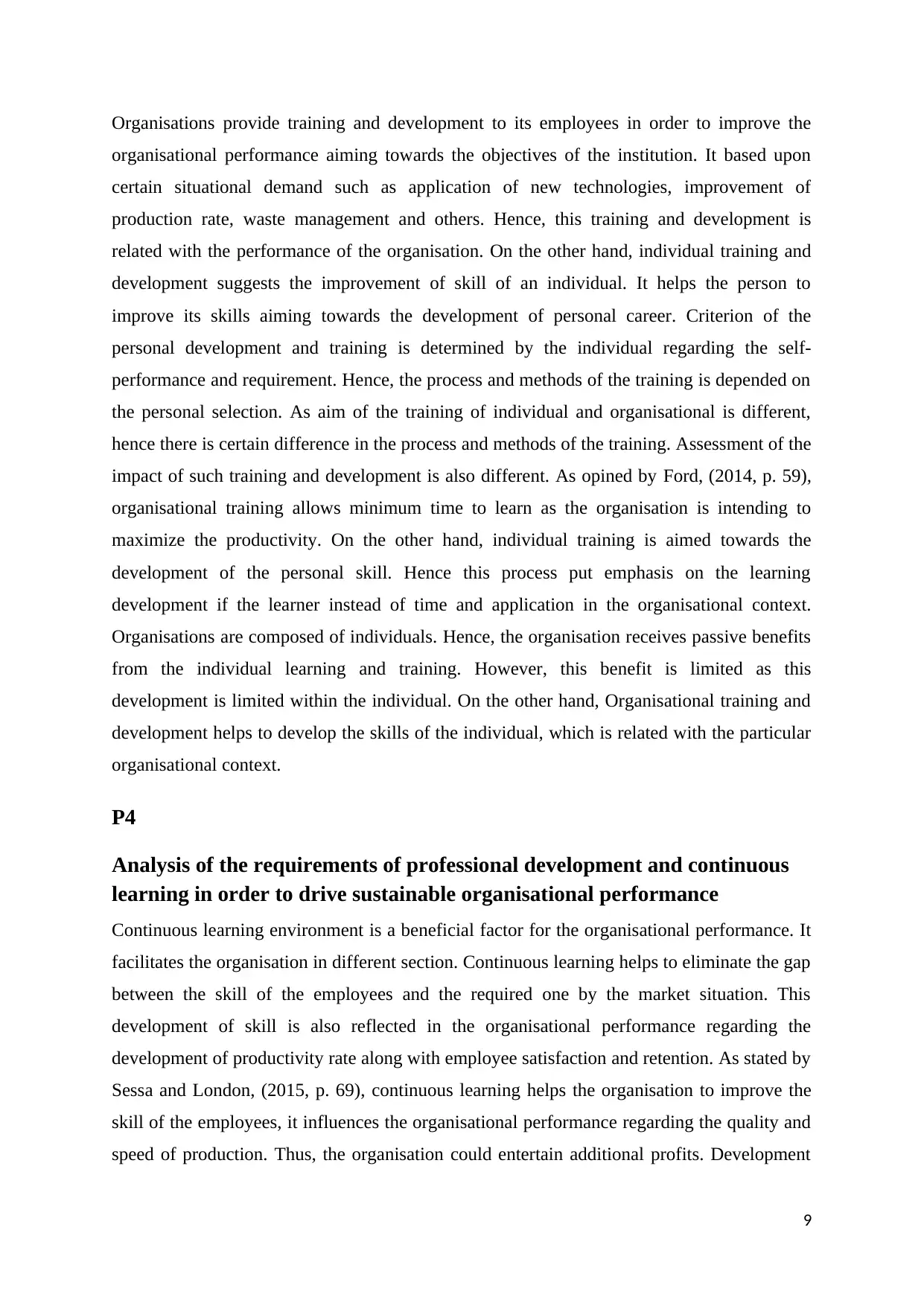
Organisations provide training and development to its employees in order to improve the
organisational performance aiming towards the objectives of the institution. It based upon
certain situational demand such as application of new technologies, improvement of
production rate, waste management and others. Hence, this training and development is
related with the performance of the organisation. On the other hand, individual training and
development suggests the improvement of skill of an individual. It helps the person to
improve its skills aiming towards the development of personal career. Criterion of the
personal development and training is determined by the individual regarding the self-
performance and requirement. Hence, the process and methods of the training is depended on
the personal selection. As aim of the training of individual and organisational is different,
hence there is certain difference in the process and methods of the training. Assessment of the
impact of such training and development is also different. As opined by Ford, (2014, p. 59),
organisational training allows minimum time to learn as the organisation is intending to
maximize the productivity. On the other hand, individual training is aimed towards the
development of the personal skill. Hence this process put emphasis on the learning
development if the learner instead of time and application in the organisational context.
Organisations are composed of individuals. Hence, the organisation receives passive benefits
from the individual learning and training. However, this benefit is limited as this
development is limited within the individual. On the other hand, Organisational training and
development helps to develop the skills of the individual, which is related with the particular
organisational context.
P4
Analysis of the requirements of professional development and continuous
learning in order to drive sustainable organisational performance
Continuous learning environment is a beneficial factor for the organisational performance. It
facilitates the organisation in different section. Continuous learning helps to eliminate the gap
between the skill of the employees and the required one by the market situation. This
development of skill is also reflected in the organisational performance regarding the
development of productivity rate along with employee satisfaction and retention. As stated by
Sessa and London, (2015, p. 69), continuous learning helps the organisation to improve the
skill of the employees, it influences the organisational performance regarding the quality and
speed of production. Thus, the organisation could entertain additional profits. Development
9
organisational performance aiming towards the objectives of the institution. It based upon
certain situational demand such as application of new technologies, improvement of
production rate, waste management and others. Hence, this training and development is
related with the performance of the organisation. On the other hand, individual training and
development suggests the improvement of skill of an individual. It helps the person to
improve its skills aiming towards the development of personal career. Criterion of the
personal development and training is determined by the individual regarding the self-
performance and requirement. Hence, the process and methods of the training is depended on
the personal selection. As aim of the training of individual and organisational is different,
hence there is certain difference in the process and methods of the training. Assessment of the
impact of such training and development is also different. As opined by Ford, (2014, p. 59),
organisational training allows minimum time to learn as the organisation is intending to
maximize the productivity. On the other hand, individual training is aimed towards the
development of the personal skill. Hence this process put emphasis on the learning
development if the learner instead of time and application in the organisational context.
Organisations are composed of individuals. Hence, the organisation receives passive benefits
from the individual learning and training. However, this benefit is limited as this
development is limited within the individual. On the other hand, Organisational training and
development helps to develop the skills of the individual, which is related with the particular
organisational context.
P4
Analysis of the requirements of professional development and continuous
learning in order to drive sustainable organisational performance
Continuous learning environment is a beneficial factor for the organisational performance. It
facilitates the organisation in different section. Continuous learning helps to eliminate the gap
between the skill of the employees and the required one by the market situation. This
development of skill is also reflected in the organisational performance regarding the
development of productivity rate along with employee satisfaction and retention. As stated by
Sessa and London, (2015, p. 69), continuous learning helps the organisation to improve the
skill of the employees, it influences the organisational performance regarding the quality and
speed of production. Thus, the organisation could entertain additional profits. Development
9
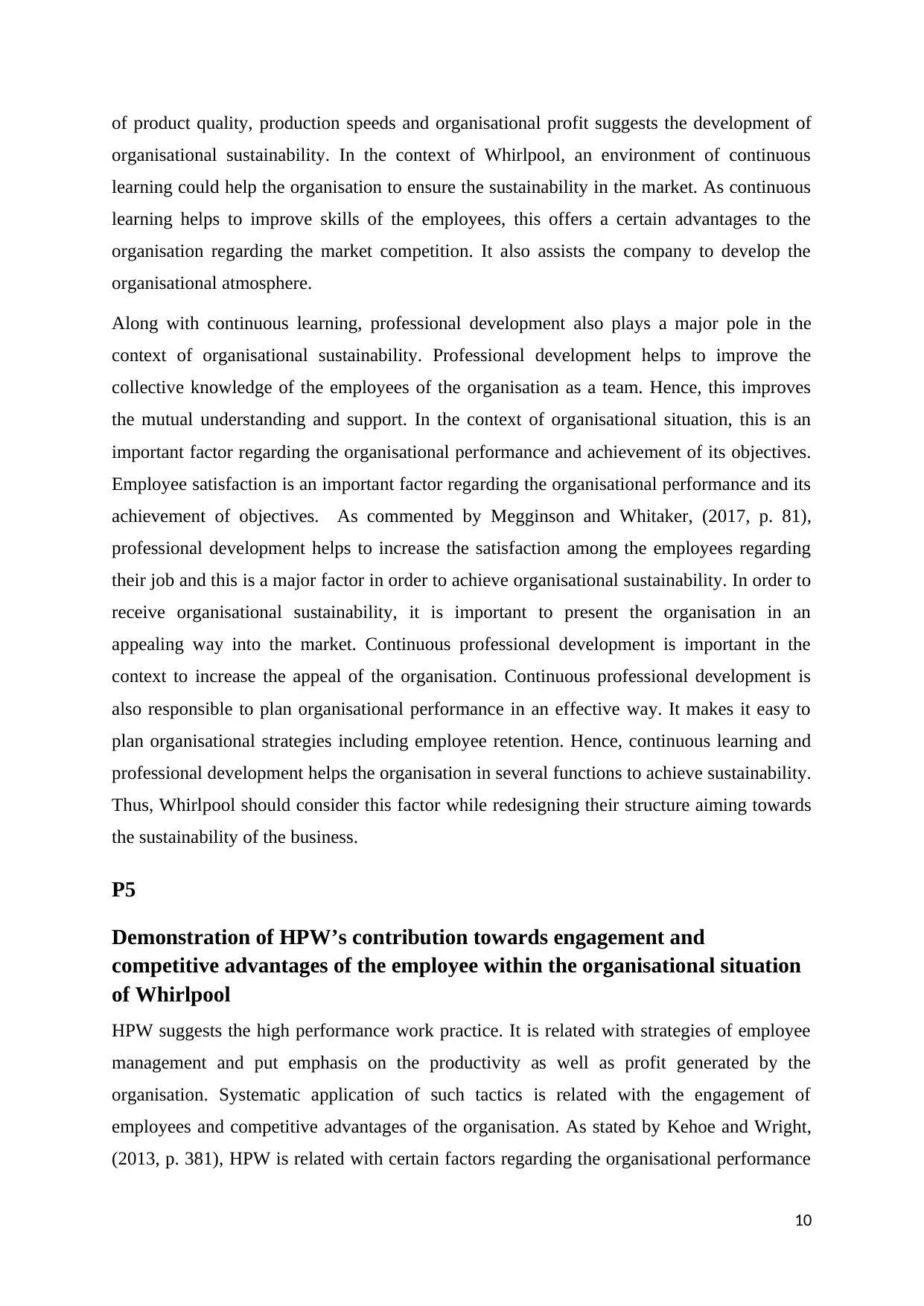
of product quality, production speeds and organisational profit suggests the development of
organisational sustainability. In the context of Whirlpool, an environment of continuous
learning could help the organisation to ensure the sustainability in the market. As continuous
learning helps to improve skills of the employees, this offers a certain advantages to the
organisation regarding the market competition. It also assists the company to develop the
organisational atmosphere.
Along with continuous learning, professional development also plays a major pole in the
context of organisational sustainability. Professional development helps to improve the
collective knowledge of the employees of the organisation as a team. Hence, this improves
the mutual understanding and support. In the context of organisational situation, this is an
important factor regarding the organisational performance and achievement of its objectives.
Employee satisfaction is an important factor regarding the organisational performance and its
achievement of objectives. As commented by Megginson and Whitaker, (2017, p. 81),
professional development helps to increase the satisfaction among the employees regarding
their job and this is a major factor in order to achieve organisational sustainability. In order to
receive organisational sustainability, it is important to present the organisation in an
appealing way into the market. Continuous professional development is important in the
context to increase the appeal of the organisation. Continuous professional development is
also responsible to plan organisational performance in an effective way. It makes it easy to
plan organisational strategies including employee retention. Hence, continuous learning and
professional development helps the organisation in several functions to achieve sustainability.
Thus, Whirlpool should consider this factor while redesigning their structure aiming towards
the sustainability of the business.
P5
Demonstration of HPW’s contribution towards engagement and
competitive advantages of the employee within the organisational situation
of Whirlpool
HPW suggests the high performance work practice. It is related with strategies of employee
management and put emphasis on the productivity as well as profit generated by the
organisation. Systematic application of such tactics is related with the engagement of
employees and competitive advantages of the organisation. As stated by Kehoe and Wright,
(2013, p. 381), HPW is related with certain factors regarding the organisational performance
10
organisational sustainability. In the context of Whirlpool, an environment of continuous
learning could help the organisation to ensure the sustainability in the market. As continuous
learning helps to improve skills of the employees, this offers a certain advantages to the
organisation regarding the market competition. It also assists the company to develop the
organisational atmosphere.
Along with continuous learning, professional development also plays a major pole in the
context of organisational sustainability. Professional development helps to improve the
collective knowledge of the employees of the organisation as a team. Hence, this improves
the mutual understanding and support. In the context of organisational situation, this is an
important factor regarding the organisational performance and achievement of its objectives.
Employee satisfaction is an important factor regarding the organisational performance and its
achievement of objectives. As commented by Megginson and Whitaker, (2017, p. 81),
professional development helps to increase the satisfaction among the employees regarding
their job and this is a major factor in order to achieve organisational sustainability. In order to
receive organisational sustainability, it is important to present the organisation in an
appealing way into the market. Continuous professional development is important in the
context to increase the appeal of the organisation. Continuous professional development is
also responsible to plan organisational performance in an effective way. It makes it easy to
plan organisational strategies including employee retention. Hence, continuous learning and
professional development helps the organisation in several functions to achieve sustainability.
Thus, Whirlpool should consider this factor while redesigning their structure aiming towards
the sustainability of the business.
P5
Demonstration of HPW’s contribution towards engagement and
competitive advantages of the employee within the organisational situation
of Whirlpool
HPW suggests the high performance work practice. It is related with strategies of employee
management and put emphasis on the productivity as well as profit generated by the
organisation. Systematic application of such tactics is related with the engagement of
employees and competitive advantages of the organisation. As stated by Kehoe and Wright,
(2013, p. 381), HPW is related with certain factors regarding the organisational performance
10
Secure Best Marks with AI Grader
Need help grading? Try our AI Grader for instant feedback on your assignments.
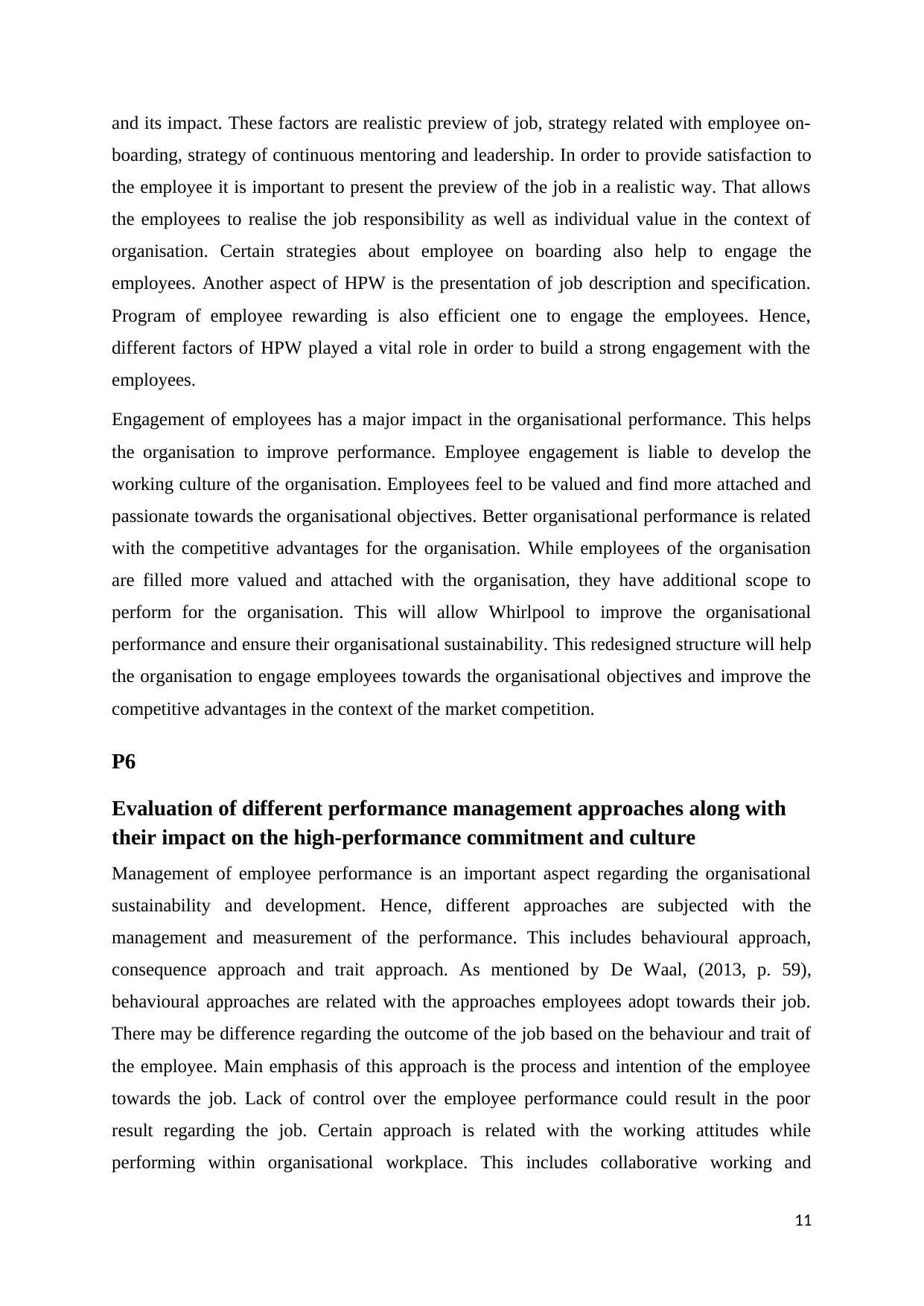
and its impact. These factors are realistic preview of job, strategy related with employee on-
boarding, strategy of continuous mentoring and leadership. In order to provide satisfaction to
the employee it is important to present the preview of the job in a realistic way. That allows
the employees to realise the job responsibility as well as individual value in the context of
organisation. Certain strategies about employee on boarding also help to engage the
employees. Another aspect of HPW is the presentation of job description and specification.
Program of employee rewarding is also efficient one to engage the employees. Hence,
different factors of HPW played a vital role in order to build a strong engagement with the
employees.
Engagement of employees has a major impact in the organisational performance. This helps
the organisation to improve performance. Employee engagement is liable to develop the
working culture of the organisation. Employees feel to be valued and find more attached and
passionate towards the organisational objectives. Better organisational performance is related
with the competitive advantages for the organisation. While employees of the organisation
are filled more valued and attached with the organisation, they have additional scope to
perform for the organisation. This will allow Whirlpool to improve the organisational
performance and ensure their organisational sustainability. This redesigned structure will help
the organisation to engage employees towards the organisational objectives and improve the
competitive advantages in the context of the market competition.
P6
Evaluation of different performance management approaches along with
their impact on the high-performance commitment and culture
Management of employee performance is an important aspect regarding the organisational
sustainability and development. Hence, different approaches are subjected with the
management and measurement of the performance. This includes behavioural approach,
consequence approach and trait approach. As mentioned by De Waal, (2013, p. 59),
behavioural approaches are related with the approaches employees adopt towards their job.
There may be difference regarding the outcome of the job based on the behaviour and trait of
the employee. Main emphasis of this approach is the process and intention of the employee
towards the job. Lack of control over the employee performance could result in the poor
result regarding the job. Certain approach is related with the working attitudes while
performing within organisational workplace. This includes collaborative working and
11
boarding, strategy of continuous mentoring and leadership. In order to provide satisfaction to
the employee it is important to present the preview of the job in a realistic way. That allows
the employees to realise the job responsibility as well as individual value in the context of
organisation. Certain strategies about employee on boarding also help to engage the
employees. Another aspect of HPW is the presentation of job description and specification.
Program of employee rewarding is also efficient one to engage the employees. Hence,
different factors of HPW played a vital role in order to build a strong engagement with the
employees.
Engagement of employees has a major impact in the organisational performance. This helps
the organisation to improve performance. Employee engagement is liable to develop the
working culture of the organisation. Employees feel to be valued and find more attached and
passionate towards the organisational objectives. Better organisational performance is related
with the competitive advantages for the organisation. While employees of the organisation
are filled more valued and attached with the organisation, they have additional scope to
perform for the organisation. This will allow Whirlpool to improve the organisational
performance and ensure their organisational sustainability. This redesigned structure will help
the organisation to engage employees towards the organisational objectives and improve the
competitive advantages in the context of the market competition.
P6
Evaluation of different performance management approaches along with
their impact on the high-performance commitment and culture
Management of employee performance is an important aspect regarding the organisational
sustainability and development. Hence, different approaches are subjected with the
management and measurement of the performance. This includes behavioural approach,
consequence approach and trait approach. As mentioned by De Waal, (2013, p. 59),
behavioural approaches are related with the approaches employees adopt towards their job.
There may be difference regarding the outcome of the job based on the behaviour and trait of
the employee. Main emphasis of this approach is the process and intention of the employee
towards the job. Lack of control over the employee performance could result in the poor
result regarding the job. Certain approach is related with the working attitudes while
performing within organisational workplace. This includes collaborative working and
11
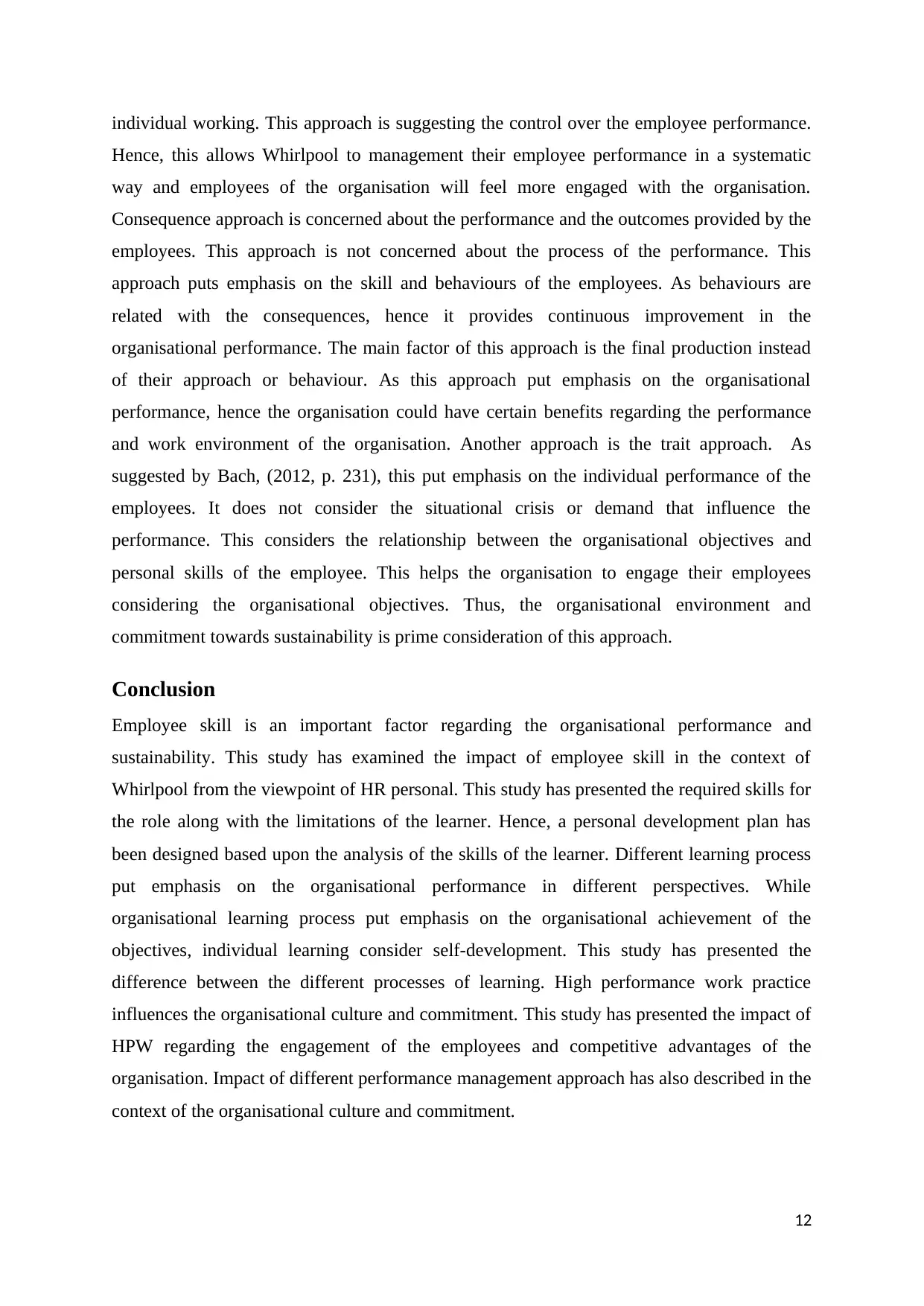
individual working. This approach is suggesting the control over the employee performance.
Hence, this allows Whirlpool to management their employee performance in a systematic
way and employees of the organisation will feel more engaged with the organisation.
Consequence approach is concerned about the performance and the outcomes provided by the
employees. This approach is not concerned about the process of the performance. This
approach puts emphasis on the skill and behaviours of the employees. As behaviours are
related with the consequences, hence it provides continuous improvement in the
organisational performance. The main factor of this approach is the final production instead
of their approach or behaviour. As this approach put emphasis on the organisational
performance, hence the organisation could have certain benefits regarding the performance
and work environment of the organisation. Another approach is the trait approach. As
suggested by Bach, (2012, p. 231), this put emphasis on the individual performance of the
employees. It does not consider the situational crisis or demand that influence the
performance. This considers the relationship between the organisational objectives and
personal skills of the employee. This helps the organisation to engage their employees
considering the organisational objectives. Thus, the organisational environment and
commitment towards sustainability is prime consideration of this approach.
Conclusion
Employee skill is an important factor regarding the organisational performance and
sustainability. This study has examined the impact of employee skill in the context of
Whirlpool from the viewpoint of HR personal. This study has presented the required skills for
the role along with the limitations of the learner. Hence, a personal development plan has
been designed based upon the analysis of the skills of the learner. Different learning process
put emphasis on the organisational performance in different perspectives. While
organisational learning process put emphasis on the organisational achievement of the
objectives, individual learning consider self-development. This study has presented the
difference between the different processes of learning. High performance work practice
influences the organisational culture and commitment. This study has presented the impact of
HPW regarding the engagement of the employees and competitive advantages of the
organisation. Impact of different performance management approach has also described in the
context of the organisational culture and commitment.
12
Hence, this allows Whirlpool to management their employee performance in a systematic
way and employees of the organisation will feel more engaged with the organisation.
Consequence approach is concerned about the performance and the outcomes provided by the
employees. This approach is not concerned about the process of the performance. This
approach puts emphasis on the skill and behaviours of the employees. As behaviours are
related with the consequences, hence it provides continuous improvement in the
organisational performance. The main factor of this approach is the final production instead
of their approach or behaviour. As this approach put emphasis on the organisational
performance, hence the organisation could have certain benefits regarding the performance
and work environment of the organisation. Another approach is the trait approach. As
suggested by Bach, (2012, p. 231), this put emphasis on the individual performance of the
employees. It does not consider the situational crisis or demand that influence the
performance. This considers the relationship between the organisational objectives and
personal skills of the employee. This helps the organisation to engage their employees
considering the organisational objectives. Thus, the organisational environment and
commitment towards sustainability is prime consideration of this approach.
Conclusion
Employee skill is an important factor regarding the organisational performance and
sustainability. This study has examined the impact of employee skill in the context of
Whirlpool from the viewpoint of HR personal. This study has presented the required skills for
the role along with the limitations of the learner. Hence, a personal development plan has
been designed based upon the analysis of the skills of the learner. Different learning process
put emphasis on the organisational performance in different perspectives. While
organisational learning process put emphasis on the organisational achievement of the
objectives, individual learning consider self-development. This study has presented the
difference between the different processes of learning. High performance work practice
influences the organisational culture and commitment. This study has presented the impact of
HPW regarding the engagement of the employees and competitive advantages of the
organisation. Impact of different performance management approach has also described in the
context of the organisational culture and commitment.
12
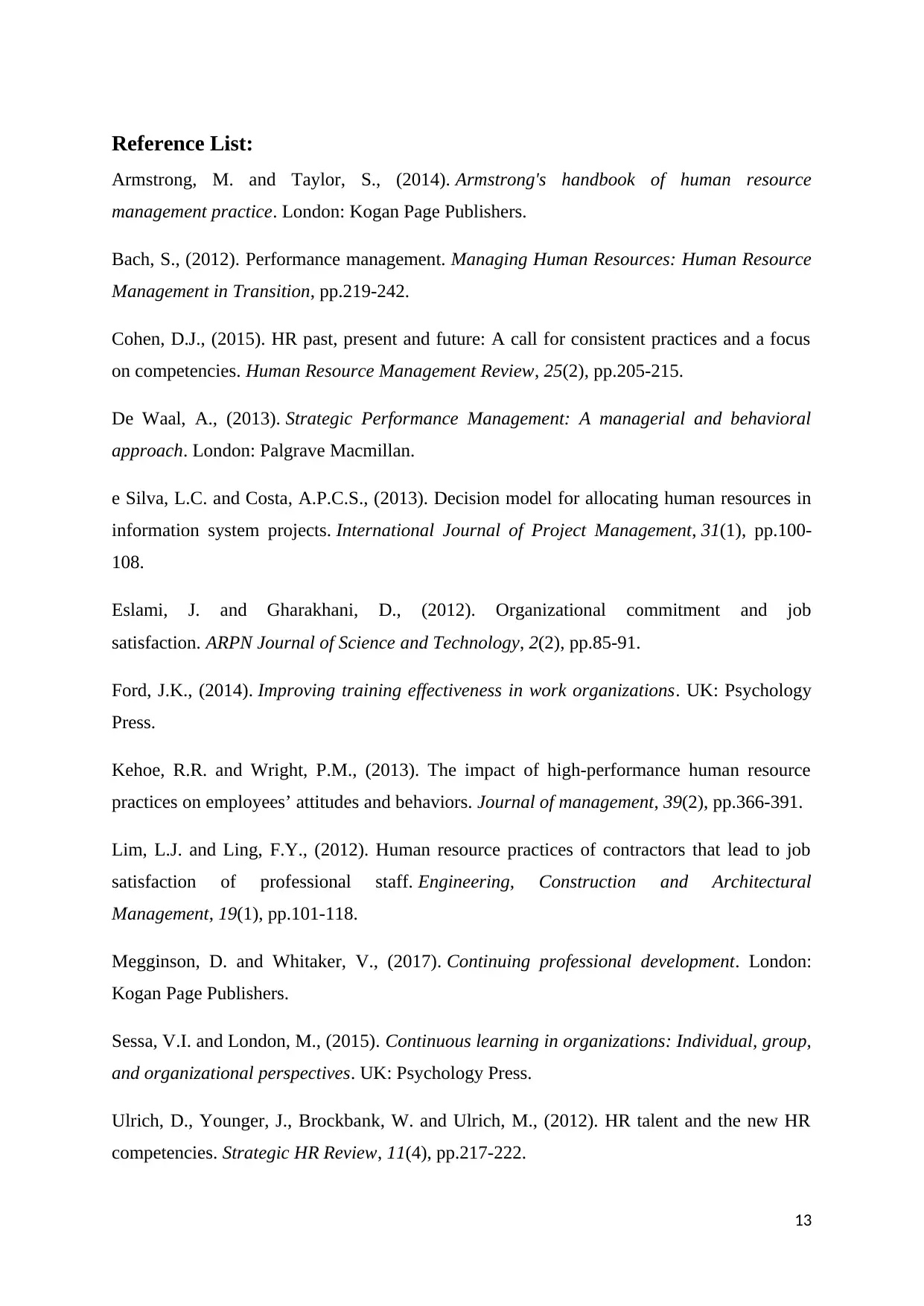
Reference List:
Armstrong, M. and Taylor, S., (2014). Armstrong's handbook of human resource
management practice. London: Kogan Page Publishers.
Bach, S., (2012). Performance management. Managing Human Resources: Human Resource
Management in Transition, pp.219-242.
Cohen, D.J., (2015). HR past, present and future: A call for consistent practices and a focus
on competencies. Human Resource Management Review, 25(2), pp.205-215.
De Waal, A., (2013). Strategic Performance Management: A managerial and behavioral
approach. London: Palgrave Macmillan.
e Silva, L.C. and Costa, A.P.C.S., (2013). Decision model for allocating human resources in
information system projects. International Journal of Project Management, 31(1), pp.100-
108.
Eslami, J. and Gharakhani, D., (2012). Organizational commitment and job
satisfaction. ARPN Journal of Science and Technology, 2(2), pp.85-91.
Ford, J.K., (2014). Improving training effectiveness in work organizations. UK: Psychology
Press.
Kehoe, R.R. and Wright, P.M., (2013). The impact of high-performance human resource
practices on employees’ attitudes and behaviors. Journal of management, 39(2), pp.366-391.
Lim, L.J. and Ling, F.Y., (2012). Human resource practices of contractors that lead to job
satisfaction of professional staff. Engineering, Construction and Architectural
Management, 19(1), pp.101-118.
Megginson, D. and Whitaker, V., (2017). Continuing professional development. London:
Kogan Page Publishers.
Sessa, V.I. and London, M., (2015). Continuous learning in organizations: Individual, group,
and organizational perspectives. UK: Psychology Press.
Ulrich, D., Younger, J., Brockbank, W. and Ulrich, M., (2012). HR talent and the new HR
competencies. Strategic HR Review, 11(4), pp.217-222.
13
Armstrong, M. and Taylor, S., (2014). Armstrong's handbook of human resource
management practice. London: Kogan Page Publishers.
Bach, S., (2012). Performance management. Managing Human Resources: Human Resource
Management in Transition, pp.219-242.
Cohen, D.J., (2015). HR past, present and future: A call for consistent practices and a focus
on competencies. Human Resource Management Review, 25(2), pp.205-215.
De Waal, A., (2013). Strategic Performance Management: A managerial and behavioral
approach. London: Palgrave Macmillan.
e Silva, L.C. and Costa, A.P.C.S., (2013). Decision model for allocating human resources in
information system projects. International Journal of Project Management, 31(1), pp.100-
108.
Eslami, J. and Gharakhani, D., (2012). Organizational commitment and job
satisfaction. ARPN Journal of Science and Technology, 2(2), pp.85-91.
Ford, J.K., (2014). Improving training effectiveness in work organizations. UK: Psychology
Press.
Kehoe, R.R. and Wright, P.M., (2013). The impact of high-performance human resource
practices on employees’ attitudes and behaviors. Journal of management, 39(2), pp.366-391.
Lim, L.J. and Ling, F.Y., (2012). Human resource practices of contractors that lead to job
satisfaction of professional staff. Engineering, Construction and Architectural
Management, 19(1), pp.101-118.
Megginson, D. and Whitaker, V., (2017). Continuing professional development. London:
Kogan Page Publishers.
Sessa, V.I. and London, M., (2015). Continuous learning in organizations: Individual, group,
and organizational perspectives. UK: Psychology Press.
Ulrich, D., Younger, J., Brockbank, W. and Ulrich, M., (2012). HR talent and the new HR
competencies. Strategic HR Review, 11(4), pp.217-222.
13
Paraphrase This Document
Need a fresh take? Get an instant paraphrase of this document with our AI Paraphraser
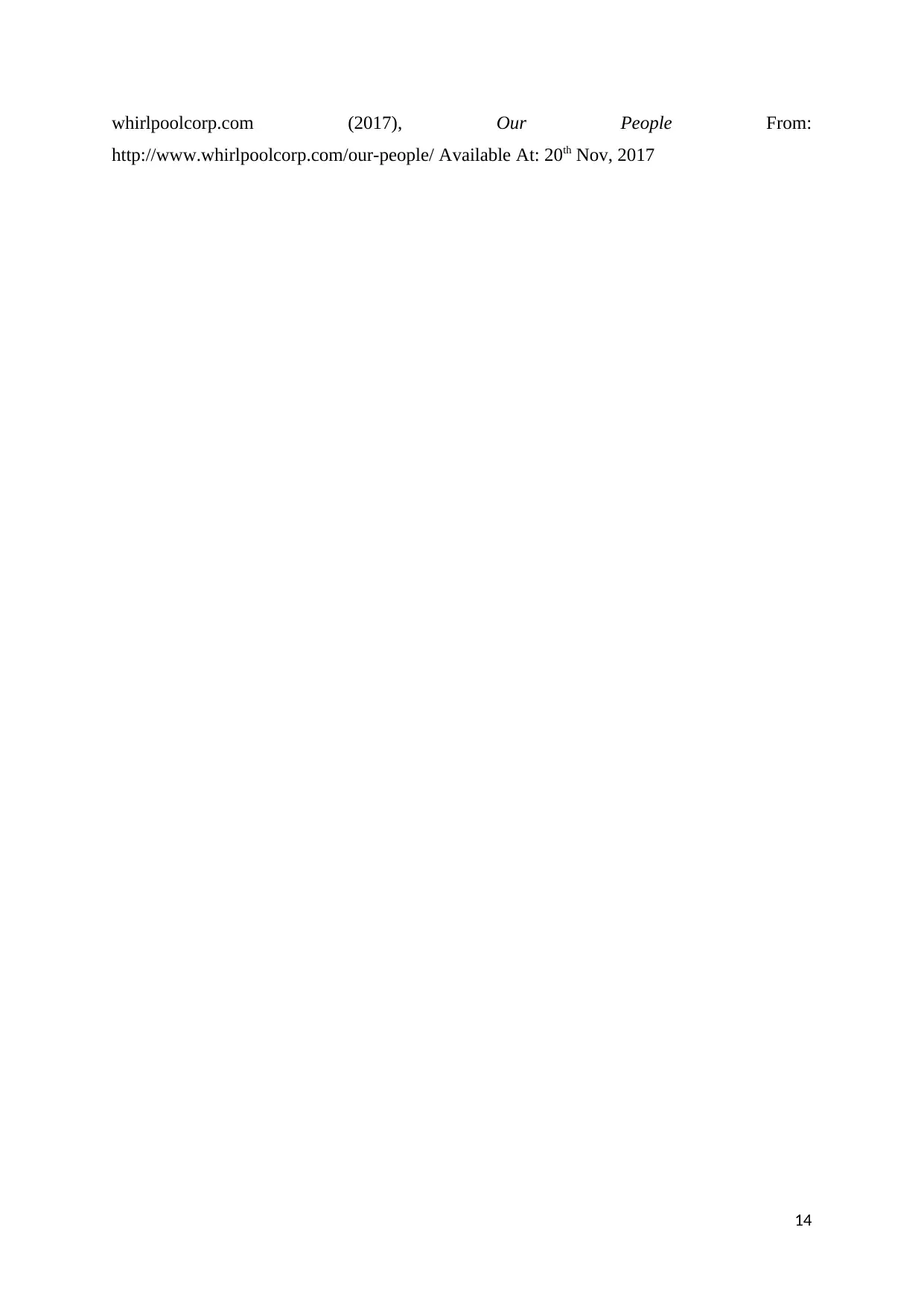
whirlpoolcorp.com (2017), Our People From:
http://www.whirlpoolcorp.com/our-people/ Available At: 20th Nov, 2017
14
http://www.whirlpoolcorp.com/our-people/ Available At: 20th Nov, 2017
14
1 out of 14
Related Documents
Your All-in-One AI-Powered Toolkit for Academic Success.
+13062052269
info@desklib.com
Available 24*7 on WhatsApp / Email
![[object Object]](/_next/static/media/star-bottom.7253800d.svg)
Unlock your academic potential
© 2024 | Zucol Services PVT LTD | All rights reserved.





